 Petzlover
Petzlover Both American Shorthair and Burmese are originated from United States. Both American Shorthair and Burmese are having almost same weight. American Shorthair may live 4 years more than Burmese. Both American Shorthair and Burmese has same litter size. Both American Shorthair and Burmese requires Low Maintenance.
Both American Shorthair and Burmese are originated from United States. Both American Shorthair and Burmese are having almost same weight. American Shorthair may live 4 years more than Burmese. Both American Shorthair and Burmese has same litter size. Both American Shorthair and Burmese requires Low Maintenance.
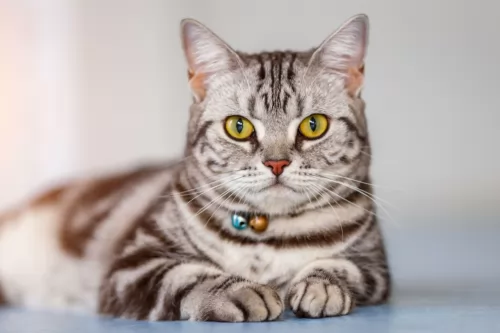 Often sailors of old would keep cats onboard to protect their stores from mice and rats, and so it was when settlers sailed from Europe to North America.
Often sailors of old would keep cats onboard to protect their stores from mice and rats, and so it was when settlers sailed from Europe to North America.
They had cats onboard and once onshore they interbred. But in the 20th century, a selective breeding program began to bring out the best qualities of these cats.
The American Shorthair is one of these cats – a pedigreed cat that is accepted by all North American cat registries. At first, the cat was known as the Domestic Shorthair but it was renamed in 1966.
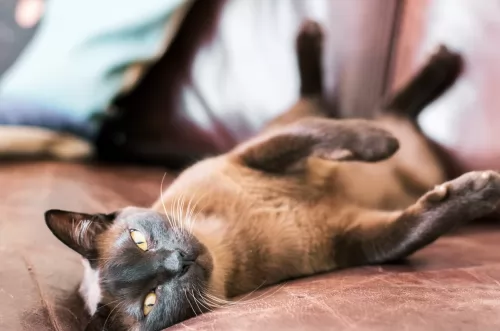 A dark brown cat together with Dr Joseph C. Thompson made their way from Burma to the United States in 1930. Cat fanciers believed that it was a dark-colored Siamese.
A dark brown cat together with Dr Joseph C. Thompson made their way from Burma to the United States in 1930. Cat fanciers believed that it was a dark-colored Siamese.
Dr. Thompson along with other breeders decided to breed the cat and she was the start of the Burmese breed.
Hybrids however, began appearing in the show hall in 1947. This was considered a violation of the show rules of the Cat Fanciers' Association and recognition of the Burmese was withdrawn until 1953. The Burmese Cat Society of America then had to give assurance to the registries that this type of thing would not happen again.
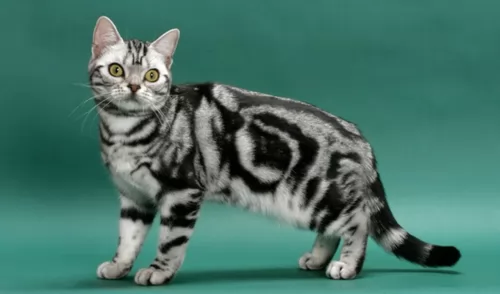 The American Shorthair is a large, sturdy cat with a round face and short ears. Their coats can come in many different patterns and colors. They shed so the fur will need to be brushed from time to time.
The American Shorthair is a large, sturdy cat with a round face and short ears. Their coats can come in many different patterns and colors. They shed so the fur will need to be brushed from time to time.
They stand at about 20 – 25cm in height and they weigh between 5 and 7kg.
The American Shorthairs are easy, no-fuss cats. They’re also low maintenance, healthy, amicable cats, ready to even be friends with strangers and your dogs.
He is an intelligent cat too so it will be important to provide him with toys that challenge him to think. These good-natured cats make perfect famiy companions.
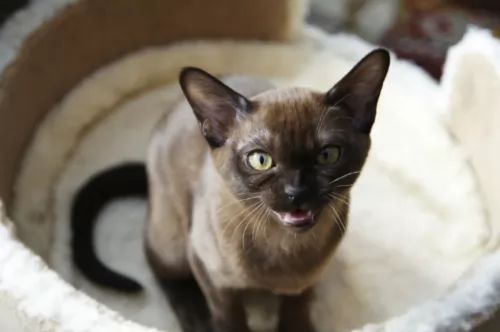 The Burmese is a medium-sized cat - fairly stocky and solid and weighs between 3 and 5kg.
The Burmese is a medium-sized cat - fairly stocky and solid and weighs between 3 and 5kg.
The dense, short coat of the Burmese comes in a variety of colors such as chocolate, cream, sable, red, tortoishell and solid colors too. The color you are most likely to see is sable.
It’s a low shedding cat so his grooming needs are low. The eyes, often a beautiful yellow shade, can be in different shades of yellow really.
Your gorgeous Burmese cat is a curious cat and finds exploring new places a huge adventure. They’re prepared to get on with some other pets in the home, but they may not be happy to welcome all cat breeds. The Burmese don't particularly like sharing their home and his human family with other cats in the home and love to get all the attention for themselves.
Once these cats mature, they do tend to settle down quite a bit and become placid, being a spectator to fun activities rather than a participant.
Still, they love their humans and are more than happy to find a place in the sun and to watch everyone from there.
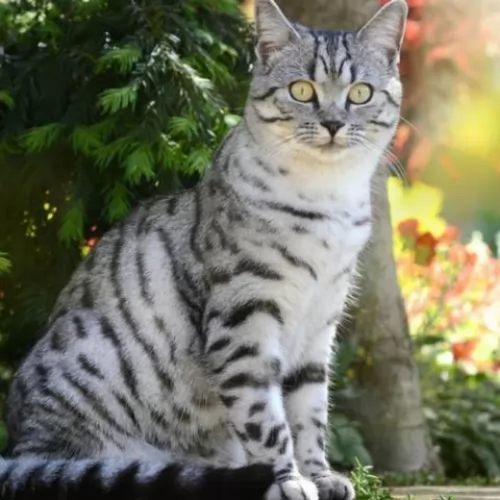 The American Shorthair is a playful cat and is quite capable of amusing himself, but will welcome your games too. He’s a big cat so make sure he gets enough exercise to avoid him becoming obese.
The American Shorthair is a playful cat and is quite capable of amusing himself, but will welcome your games too. He’s a big cat so make sure he gets enough exercise to avoid him becoming obese.
He is a low maintenance cat and you don't have to be worrying about him too much as he just likes to get on with life. He loves being well-fed, getting your attention and lying in the sun.
This is one cat that doesn’t need a lot of attention so being easy to care for, independent, playful, and affectionate, you’re going to have one of a kind companion and friend.
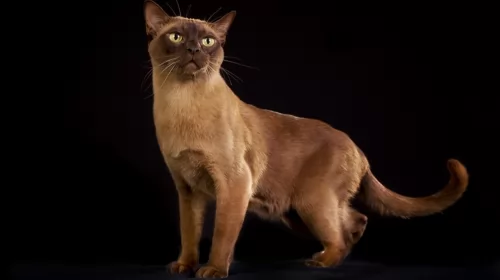 The Burmese cat loves to climb and survey his world from a high perch so don’t forget to invest in some kind of climbing apparatus or cat tree for him.
The Burmese cat loves to climb and survey his world from a high perch so don’t forget to invest in some kind of climbing apparatus or cat tree for him.
He tends to become a bit inactive as he gets older and this can be a problem and lead to obesity. Encourage your Burmese cat to come out and play to make sure he gets enough exercise.
He loves being noticed by his human family and will thrive on being petted and noticed, and of course, you’ll want to, as a Burmese has got a whole love of loving to give you too.
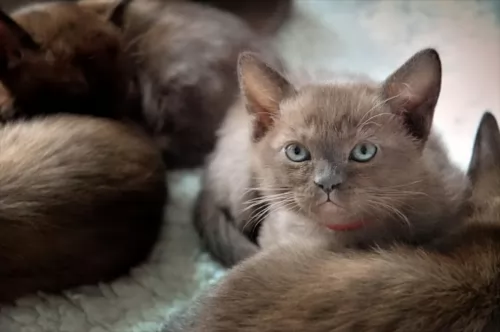 These cats are a healthy breed and if you take good care of your Burmese he can live to up to 13, 14 or 15 years of age.
These cats are a healthy breed and if you take good care of your Burmese he can live to up to 13, 14 or 15 years of age.
But you have to be aware of diabetes mellitus as well as something known as hypokalaemic polymyopathy – muscle weakness because of low blood potassium levels.
You’ve also got to look out for obesity as these are sturdy, stocky cats and overeating can lead to obesity and a host of health issues such as painful joints and diabetes.
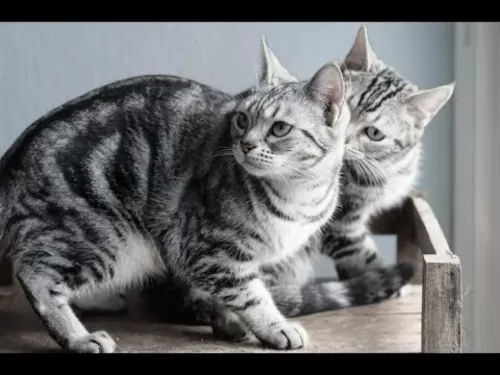 Your American Shorthair will benefit greatly from regular brushing and he looks forward to this grooming period and being pampered by you for a few minutes.
Your American Shorthair will benefit greatly from regular brushing and he looks forward to this grooming period and being pampered by you for a few minutes.
It helps to remove the dead hair from his coat and this is important so that he doesn’t ingest the loose hair. While you’re brushing him, you can also run your fingers over him to make sure there are no unusual lumps. Anything odd or any sign of illness you should take your cat to see the vet immediately.
Make sure your American Shorthair has access to the best quality food there is. There are many commercially manufactured cat foods available and your vet can advise you on the best one to choose.
Cats are carnivores so aways choose food that is high in proten. Food must be provided in accordance with the cat’s age and energy levels. Certainly a generic cat or one with a medical condition will need a certain type of food than a young, frisky kitten. Make sure your cat always has access to fresh, cool water.
Make sure your furry feline friend has everything he needs to ensure he is comfortable. This includes feeding bowls, toys, a litter box, soft bedding, nutritious food as well as scratching post and climbing equipment.
Have your pet neutered or spayed if you don’t want kittens from your cat. These procedures have enormous health benefits for your pet and it prevents even more kittens coming into a world that already has far too many unwanted pets.
Make sure your cat is up to date with all his vaccines because without being vaccinated your cat can succumb to any one of the life-threatening cat illnesses there are. Kittens need to have their first vaccines at 8 weeks of age.
If you have to take your cat to the vet you need a carrier basket so that your cat feels comfortable and safe inside it.
You can’t just put your cat on a leash and take him to the vet as inside the car he will lurch around and cause you to lose attention. A transport box that is familiar to your cat will be the best way for you and your cat to travel.
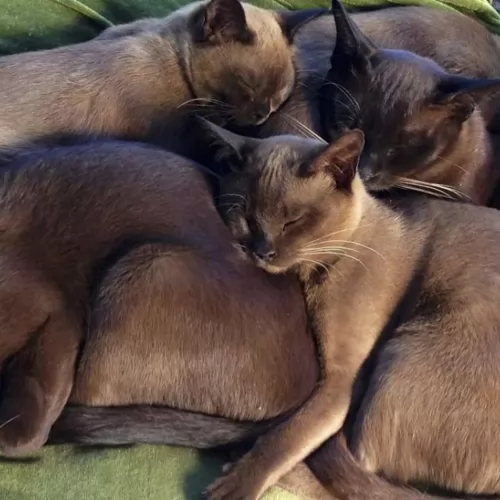 Burmese cats are naturally good climbers and you will need to provide these cats with some kind of climbing tree or something else where they can climb and perch.
Burmese cats are naturally good climbers and you will need to provide these cats with some kind of climbing tree or something else where they can climb and perch.
While adult Burmese cats tend to be fairly placid cats, they still love to play and love the interaction between themselves and their humans. As he gets older, don’t forget to keep up a regular playtime with him.
Shedding is minimal with the Burmese cat and weekly brushing will be a good bonding session and also keep your Burmese cat’s coat healthy and shiny by removing dust and loose hair.
Your fur child requires the best – a balanced cat food packed with protein to support him in all his activities and to ensure he maintains a good weight.
There are many excellent commercially manufactured cat foods on the market so learn to understand the ingredients and what nutrients are required.
Certainly, your Burmese kitten will require a complete and balanced kitten food with all the right nutrients to ensure good bone and coat growth. Then it is time to choose a kitten food which will later change to adult food as your kitten matures.
There are excellent cat foods for every stage and season of your cat’s life and from top brands – people who know the needs of cats.